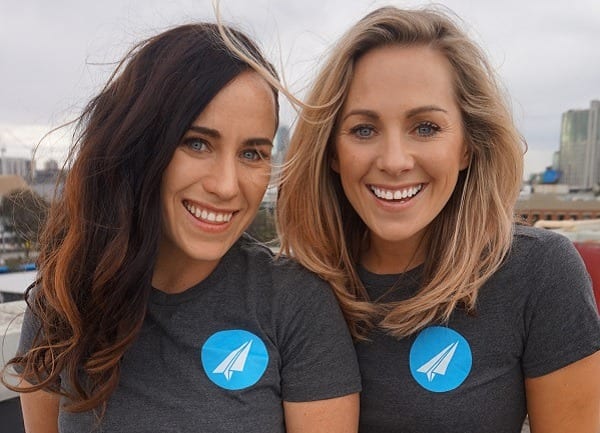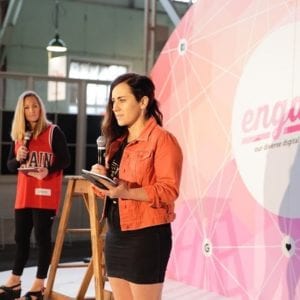“The idea that young people can lead change on these issues isn’t new to us – in fact, it’s in the DNA of PROJECT ROCKIT,” Rosie shared with Women’s Agenda recently.
PROJECT ROCKIT is just about to kick off a new initiative called PROJECT ROCKIT Digital Ambassadors. They’ve received $1 million from their partners Facebook and Instagram to launch the program focused on tackling online hate and bullying.
“Our team will be travelling across Australia to transform 10,000 young people into Digital Ambassadors who will be united and ready to tackle online hate and build a safer, kinder digital world.”
In 2018, Rosie and Lucy were finalists for Agenda Setter of the Year at the Women’s Agenda Leadership Awards.
Below, Rosie tells Women’s Agenda about the early days of PROJECT ROCKIT, how she deals with imposter syndrome everyday and shares some excellent advice for other women looking to find a start in business.
Can you tell us a little about the beginnings of PROJECT ROCKIT? Why did you decide to launch the business?
My sister, Lucy and I started PROJECT ROCKIT over thirteen years ago when we were fresh out of high school. At the time, we kept hearing this statistic that 1 in 6 young people report being bullied (today that statistic is 1 in 4). We were sick and tired of receiving the negative messaging as young people that we “didn’t care” or that we are all “bullies or victims”. Having just finished school, we knew exactly what it was like to be bullied and exactly why it was so difficult to stand up. We cared and we wanted to do something, we just didn’t always know how.
We decided that rather than further label young people by “dealing” with them as “bullies and victims”, we would inspire the majority of people in a bullying situation – the audience – to use their empathy and power for good.
Most importantly, we decided that PROJECT ROCKIT would not be a boring, judge sobfest or lecture. Instead, workshops would be wild, fun, interactive, positive and even cool. We’d put young people’s opinions at the centre of everything we do.
Our vision was to build a world where kindness and respect thrive over bullying, hate and prejudice and all young people are free to realise their potential. That vision has never felt more important.
As a young person leaving school, did you feel confident that PROJECT ROCKIT would take off and be successful in the long-term?
Starting PROJECT ROCKIT fresh out of high school, we had absolutely no idea if it was going to work. To be honest, we didn’t have grand ambitions of launching a business, a national organisation or a social movement. We just saw a problem that desperately needed fixing and no one was doing it in a way that was genuinely reaching young people. What we did know is that someone should do something about it and maybe we could be those someones!
Those early days were an incredibly hard and incredibly fun slog. But what kept us going was this bubbling excitement what we were doing was working. That even though so many people thought we were just a couple of young, female, pipsqueaks working on this wild idea, there were so many others who were hungry for this type of program. We started to realise that what we were creating was so much more than that.
Instigated by a workshop, PROJECT ROCKIT was becoming a social movement that was led by thousands of students. We knew we owed it to these young people to turn this wild sister duo into Australia’s youth-driven movement against bullying, hate and prejudice. And the rest is history!
What are you working on right now at PROJECT ROCKIT that’s got you excited?
We’re just about to kick off a brand new anti-bullying initiative in Australia called PROJECT ROCKIT Digital Ambassadors. Thanks to a very generous contribution of $1 million from our partners at Facebook and Instagram, our team will be travelling across Australia to transform 10,000 young people into Digital Ambassadors who will be united and ready to tackle online hate and build a safer, kinder digital world.
The idea that young people can lead change on these issues isn’t new to us – in fact, it’s in the DNA of PROJECT ROCKIT. Run by young people for young people, these events will explore the risks and rewards of the digital world, foster empathy and equip students with the leadership tools they need to pollinate change back in their own school communities.
Biggest hurdle you’ve faced (or are still facing) in your career?
…How did you push through/work around it?
Imposter syndrome. For someone who is the co-founder of an anti-bullying organisation you’d be surprised by the nasty voice in my head that could rival any high school mean girl.
For me, a practical antidote to this is to do more of what I’m good at and to seek learning opportunities to upskill what I’m not very good at.
Growing up and building PROJECT ROCKIT all at the same time means that I’ve had to work everything out as I go.
Those imposter syndrome voices are usually an indication that I need to reconnect with what I’m good at e.g. public speaking. This tends to reignite my confidence. But those voices are also an indication that I need to seek out some development to give me what I need to unlock the next level of business.
I wouldn’t say that I’m nailing this hurdle but I’m working on it every day.
What tips would you offer other young women who are thinking of starting their own business?
Say it out loud. This is about backing yourself but it’s also about holding yourself accountable to action. It’s uncomfortable but helpful when people remind you of your dreams!
Ask for help. No one is amazing at everything. The day I realised I didn’t have to be good at everything was a truly liberating day. There are so many people out there that want to help you. If you keep your idea in your head because you’re being self-critical or a perfectionist, it will stay just there – – in your head.
Don’t apologise. As women, I think we do a lot of apologising. “Sorry, can I just say that?”. Sound familiar? Starting a business requires confidence and momentum so I prefer the approach: ‘Do now, and (with great humility and respect), ask for forgiveness later.’ If this isn’t your style, try swapping out “thank you” for “sorry”. You’d be surprised how much this tiny action reorients your self-image from guilt to confidence.
Be bold. Don’t lose focus by comparing yourself to what everyone else is doing. Building a business or creating social change takes time. First, it takes vision to see a better way. Next it takes action to pave the way.
But then it takes an awful lot of bricks to be laid before others even identify it as the best way forward. Once they do, their footprints will help firm up the trail and your momentum will build. Moral of the story, stick to it.
Leverage the community. You know how I said that people want to help you? The women in the business community are strong. Make the most of the networks, funding opportunities, accelerator and incubator programs, online forums, mentoring… the list goes on.
If you had the chance, what would you go back and tell yourself ten years ago?
Get good at making mistakes. You’re going to make a sh*t ton of them! You will learn that as a social entrepreneur, it’s not about you, it’s about your impact. This helps take the ego out of failure (and success) and allows you to be humble and put your work first. When we do this, we realise how necessary failure is in truly stretching and testing out an idea to its fullest capacity.
P.S. Your hair looks like a helmet – you should grow it out 😉





